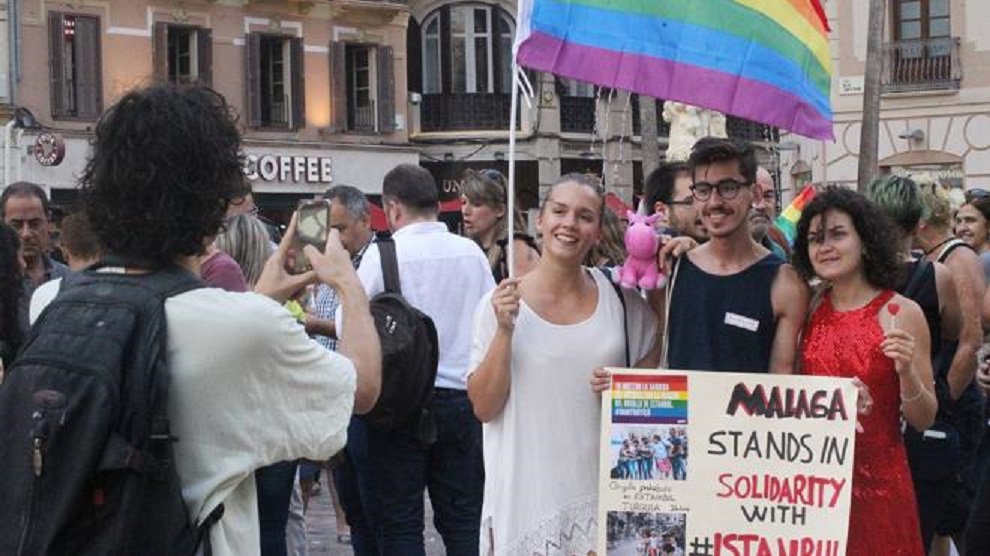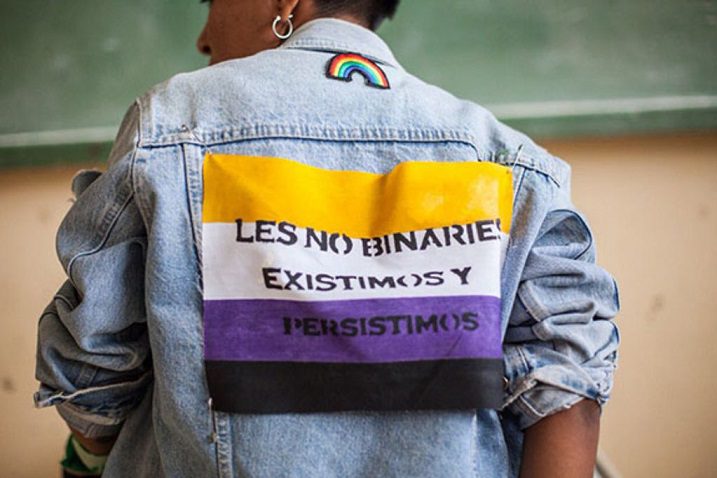By Charls Monz, Content Creator for Vamos Academy.
Argentina is the first Latin-American country to legally recognize other non-binary gender categories since July 2021. It became law through a presidential decree. With this action, Argentina joins the group of countries with advanced social rights which also have Non-Binary Documents like Australia, Germany, New Zealand, Canada, and some states of The US.
In this article, we’ll tell you about the important journey that Argentina has gone through in order to achieve a Non-Binary Document for its people.
When it comes to Latin American countries, Uruguay has an Integral Law for Trans People according to which they can change their name and gender on their document but they still only offer two options on their Civil Registry: “Trans Woman” and “Trans Men”, which are deeply stigmatized. It’s curious that neighbouring countries like Uruguay, which have come so far promoting social rights for their people, still have a long way to go.
Also read: Gay Rights in Argentina
This new document provides the possibility of a third option on the gender box in the Argentine DNI (National Document of Identity) besides the customary female and male: an “x” which can be used for non-binary people, as well as intersex, gender fluids, agender or any person who feels their identity doesn’t match with the binary categories. Thanks to this decree, all non-binary people have now the right to ask for an Identity Document and Passport respectful of their self-perceived Gender Identity. It will also help create new data and statistics for an invisibilized population.
This action takes part in a long history of gender rights and social rights for the Argentinian LGTBIQ+ Community. These include Equal marriage in July 2010 (Argentina was the 10th country to approve same-sex marriage), Gender Identity Law in May 2012 and the “Diana Sacayan” Law: which stipulates a quota for hiring transvestites and trans people in the public sector, approved in July 2021. The Gender Identity Law says that every person has the right to the recognition of their gender identity, and can also legally change the data in their National Documents. These actions were also possible thanks to the major social manifestations throughout the years, which became increasingly more important after the appearance of the movement “Ni Una Menos” in 2015.
The “Diana Sacayán” Law was approved in Congress and specifies that at least 1% of jobs in the State must be occupied by transvestites and trans persons who are qualified for the job. This Law intends to provide decent work opportunities for them. The average life span for Trans people in Argentina is around 41 years, due to poor conditions on their quality of life: the majority of them have to leave their houses at very young ages, it’s almost impossible for them to access formal jobs, and the social discrimination is huge. From institutional violence from medical professionals to symbolic violence such as calling trans people by their dead name (the name they were given when they were born). This law it’s named after Diana Sacayán, an activist for the LGTBQ+ community rights, who was brutally murdered in 2015. Her murder was the first one in the country to be contemplated as “aggravated homicide by gender identity or sexual orientation”.
Also read: 5 Best LGBT Hotspots in Buenos Aires
At the presentation event of the new Non-Binary Document, the president Alberto Fernandez, next to Elizabeth Gómez Alcorta (Minister of the Women, Genders and Diversity Ministry) delivered the first 3 Non-Binary Documents. One of the participants at the moment of receiving it opened their shirt and showed the caption: “we are not an X”, demanding that the gender area remain open for all diverse gender identities. Another participant in the public followed the claim shouting: “We are not an X, our internal feeling is not an x”.
For the moment, the “x” is the way Argentina found to follow the international conventions. It chose to adhere to the guidelines of the ICAO (International Civil Aviation Organization). This organization regulates the standard for international civil aviation and says that is mandatory to complete the gender box: it could be filled with “F” for female, “M” for male or “X” in case it’s indefinite. The Argentine president responded to the claim: “This is only a step we are making that I hope will end the day where nobody will ask you which gender you are” and finished with “Between the ideal and the possible thing, we have to take the possible way because we are each day closer to the ideal”.


One of the first persons that publicly showed their non-binary document was Tani Fernadez, aka “Dyhzy”, Alberto Fernandez’s child. They say: “It’s good to understand that a plastic doesn’t say who I am, nor defines your identity. But it includes me in a legal framework that respects my identity. So I’m very happy about it”. Tani is a reference for the Argentine LGTBQI+ community: they came out as bisexual and went to the presidential inauguration carrying a pin with the LGTBQI+ flag. They were also called out on Twitter by the son of Jair Bolsonaro, comparing a picture of himself with a gun with a picture of Tani dressed as Drag Queen. Dyhzy only sent a message to the LGTBQI+ community in Brazil: “Brasilian brothers, we are fighting together, I love you”.
So, there’s still a long way to go, especially concerning women and the LGTBQI+ community rights. But we are getting there, baby steps. It is crucial that its legal framework joins what is happening in its society and that the Argentine State hear its people out.
Argentina slowly becomes a country with more and more rights for those who “were previously considered minorities”, and also a safe environment for everyone to live, express and love. We can confidently say that Argentina is a great destination for the LGBTQ+ community to discover and to learn Spanish in Buenos Aires
Spain Passes Bill that Allows Individuals to Legally Change Their Gender on National ID’s
According to THE LOCAL Media Outlet “Spain approves trans law that allows easy gender change on ID”
The legislation also bans conversion therapies, promotes non-discrimination against LGBTI people in the workplace and seeks “to advance the inclusion” of transgender women in particular who tend to be disproportionately affected.


In a highly contentious vote, the draft bill aimed at simplifying the process of changing gender on a national identity card was approved by a majority of 188 votes in favor, with 150 against and seven abstentions. The bill is now expected to move to the Senate where it is expected to be passed into law within a matter of weeks, without any significant alterations.
The proposed bill seeks to streamline the gender change process by allowing individuals to request a change based on a simple statement. While this has been welcomed by some LGBTQ equality campaigners, it has sparked a bitter dispute among activists in Spain’s powerful feminist lobby.
Thinking of Visiting Spain? Discover more about gender related topics while visiting our Spanish School in Malaga.
Hey there! I’m Maria Olson, your go-to nomad with a suitcase in one hand and a pen in the other, forever caught in the dance of Buenos Aires’ energy and Malaga’s serene vibes. My life’s an open book of travels, stitched together by the countless cultures I’ve embraced and the languages that now flow from my tongue as easily as my native speech. Speaking Spanish, English, French, German, and Russian isn’t just a party trick; it’s my way of unlocking the world’s secrets, one conversation at a time.
But let’s talk about the real spice of life—food. My adventures are nothing without the flavors I’ve savored and the culinary treasures I’ve unearthed along the way. Whether it’s diving into Argentina’s vibrant markets or sipping on sangria in a hidden corner of Spain, I bring these experiences to the table, sharing a slice of the world through my tales.
Crafting blogs for VAMOS Academy, I blend my wanderlust with a dash of creativity to serve up content that’s as unique as the journeys that inspired them. So, if you’re itching for adventure, hungry for a taste of the unknown, or simply curious about the art of language, you’re in good company.




